Protest Erupts As Morality Police Base In Shiraz Set Ablaze
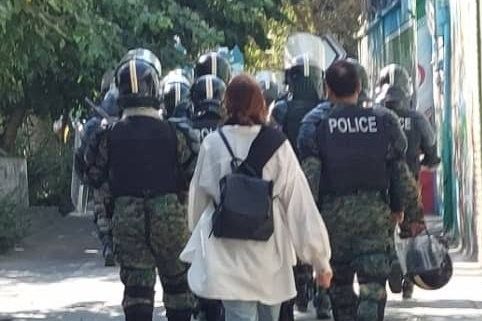
A base of the morality police in Afifabad Street, Shiraz, was set ablaze Saturday as hijab crackdowns reach unprecedented levels across Iran.

A base of the morality police in Afifabad Street, Shiraz, was set ablaze Saturday as hijab crackdowns reach unprecedented levels across Iran.
The incident follows more than a year of nationwide protests sparked by the death in morality police custody of Mahsa Amini last September, which has seen growing numbers of women in Iran rejecting the mandatory hijab.
Iran's parliament has since passed a stringent 'hijab bill' in mid-September, threatening violators with a severe penalty of up to ten years' imprisonment, in addition to stepping up morality police patrols and digital surveillance.
Women have been increasingly defiant ever since, going in public spaces such as shops, cafes and universities unveiled, and the regime has consequently deployed agents known as ‘hijab enforcers’ to public places.
Many hijab defiers have since been fined, jailed and banned from public spaces including schools and universities.
In late October, Armita Geravand, a 16-year-old student, succumbed to a head injury sustained during an encounter with Tehran's hijab enforcers in echoes of the death of Mahsa Amini one year before.
Armita fell into a coma on October 1st after being stopped by enforcers in the Tehran subway. While the government has not provided clear information about the incident, it appears that a female agent pushed her, leading to a severe head injury.
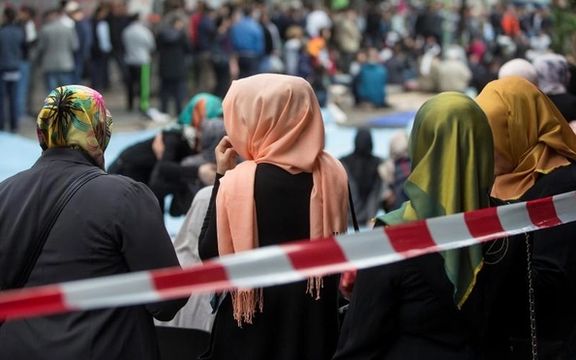
The German human rights commissioner who rebuffed Iranian female dissidents on Thursday, reportedly views the hijab as a form of emancipation for women.
The Iranian dissident, Masih Alinejad, pulled the plug on a meeting with the federal human rights commissioner, Luise Amtsberg, because Amtsberg did not wish to publicize the substance of the discussion.
The German magazine Stern reported in 2017 that the Green party politician had said she learned the head scarf can be a sign of emancipation, adding “We forget that sometimes.”
Amtsberg wrote her master’s thesis on “Feminism in Islam: Using the example of the Palestinian women’s movement.”
Lawdan Bazargan, a California-based Iranian-American political and human rights activist, told Iran International, “The hijab is an ideology, and like any ideological belief, it is linked to 'interests' and 'power.’ The hijab serves a dual function; it privileges veiled women in Islamic societies while also helping to reproduce the system's inherent patriarchy."
Bazargan, who is currently campaigning to secure the dismissal of Oberlin College’s Mohammad Jafar Mahallati, Iran’s former ambassador to the UN, added, “Ultimately, the hijab humiliates and disempowers women in society. It is shameful for a European woman, born and raised in a democratic country with liberal values, to idolize a symbol that oppresses millions of women, acting like a chain around their necks, suffocating them.”
Alinejad has long campaigned against the hijab. The Islamic Republic of Iran imposed the mandatory hijab on women after the 1979 revolution in 1981.
Iran International reported last week that the clerical regime has impounded the cars of people who violate the rules of the mandatory Hijab. In 2022, after dozens of Iranian women unveiled in public and sent their videos to Alinejad in New York, the clerical regime said women can be sentenced up to 10 years in jail for sending Alinjead the footage.
The outrage over Amtsberg’s attempt to silence the Iranian dissidents in Berlin has shined a new spotlight on the Green party’s overly cordial relationship with the Islamic Republic.
Amtsberg’s Green party has a long tradition of holding public meetings with Iranian regime officials and politicians who have denied the Holocaust, defended the use of stoning for adultery, and engaged in killing Iranians.
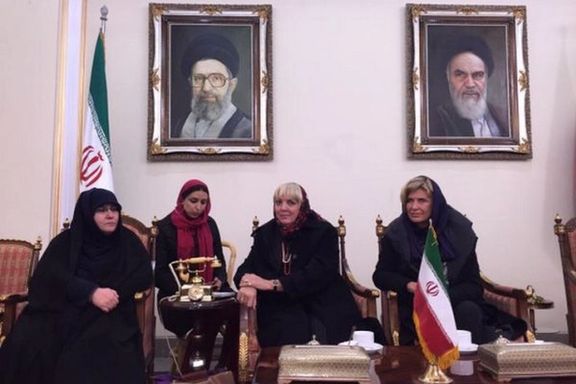
In 2019, Germany’s best-selling newspaper, Bild, published a series of news articles and an editorial titled “Shame on the Bundestag” that exposed the then-Green party Bundestag vice president Claudia Roth’s enthusiastic greeting of the former speaker of the Iran’s ersatz parliament, Ali Larijani.
Larijani defended former Iranian president Mahmoud Ahmadinejad’s denial of the Holocaust at the 2009 Munich Security Conference.
Roth is currently Germany’s cultural minister and, in 2010, met in Tehran with the former speaker's brother, Mohammad-Javad Larijani, who defended the stoning of people who committed adultery. Mohammad-Javad Larijani served as the head of the Iranian Human Rights Council. A year before Roth’s meeting, he denied the Holocaust at a German foreign ministry-sponsored event in Berlin held close to the Holocaust memorial.
Roth courted Manouchehr Mottaki who, while foreign minister, delivered a key speech at Tehran’s 2006 Holocaust denial conference.
The largely pro-Iran politician, Roth, also high-fived then-Iran ambassador to Germany, Reza Sheikh Attar, at the 2013 Munich Security Conference. Iranian Kurdish dissidents accused Attar of carrying out a massacre of Kurds during his tenure as governor of Kurdistan and West Azerbaijan provinces between 1980-1985.
The German foreign minister, Annalena Baerbock, has also faced intense criticism from German opposition politicians and Iranian dissidents for her dovish posture toward Tehran. Baerbock refuses to sanction the IRGC as a terrorist organization. She claims to practice a “feminist foreign policy” but her inaction toward the IRGC—a US-designated terrorist organization dedicated to enforcing the mandatory hijab—has sparked criticism from Alinejad and other Iranian dissidents.
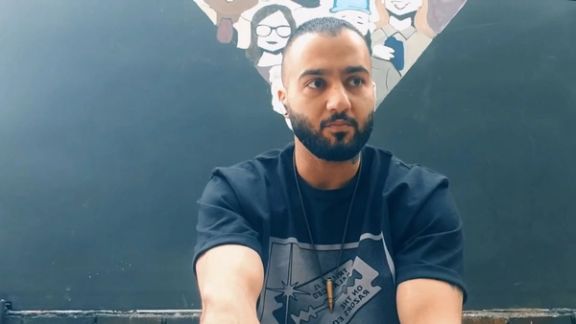
Ye-One Rhie, a German lawmaker and political sponsor of Iranian rapper Toomaj Salehi, has issued an urgent call for his release after his second arrest.
In a conversation with Iran International, Rhie expressed deep concern about Salehi's well-being, emphasizing the lack of information about his whereabouts.
Toomaj Salehi, 33, was apprehended by plainclothes individuals on a street in Babol, northern Iran, on Thursday. He was reportedly subjected to severe physical abuse during the arrest, including beatings with the butts of AK-47 rifles and pistols, as reported on his social media page.
Rhie underscored the Iranian regime's fear of Salehi's message, stating, “The fact that he was taken again shows the Iranian regime is very, very afraid of him and what kind of message he's sending to all those people who are unhappy, who are not satisfied with how the country is going, how Iran is developing.”
Salehi had previously spent over a year in prison, with 252 days in solitary confinement, before being released on bail on November 18th. Following his re-arrest, social media erupted with a trending campaign, garnering over 75,000 mentions of Toomaj Salehi on various platforms.
Rhie concluded by demanding answers from the Iranian authorities, stating, “I am very positive that Salehi is such a man that the Iranian regime will not be able to break him at all and not to break his spirits. I'm demanding answers as I wrote to the ambassador of the Islamic Republic of Iran in Berlin, to tell me where he is.”
Salehi gained prominence for his protest songs addressing social issues and government injustices in Iran. His initial arrest in October 2022 was part of a broader crackdown on political opponents of the regime. Rhie urged the dropping of all accusations, sentences, and the release of Salehi and other political prisoners, emphasizing the injustice of their detention.
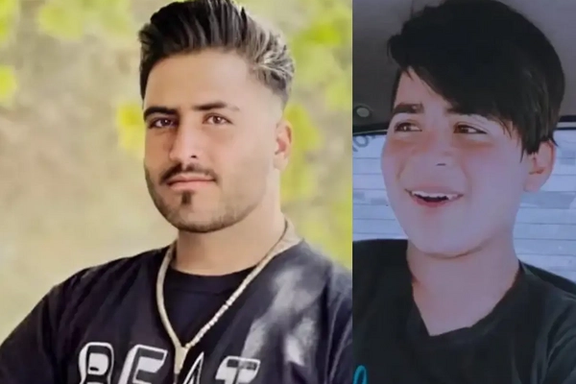
Reacting to reports of the execution of a young man and a young protester, the European Union has called on Iran to refrain from any future executions.
Peter Stano, lead spokesperson for foreign affairs and security policy of the European Union, stated on Friday, "There are credible reports that a minor, Hamidreza Azari, and a protester, Milad Zohrevand, were executed in Iran on November 24 and 23 respectively," emphasizing the European Union’s "firm and principled opposition to the use of capital punishment at all times and in all circumstances." Iran has hanged nearly 700 people this year alone.
Stano also underlined that as a party to the International Covenant on Civil and Political Rights and the Conventions on the Rights of the Child, the Islamic Republic is prohibited from imposing the death penalty for crimes committed under the age of 18.
Hamid Azari was hanged on Friday morning at the Central Prison of Sabzevar in the northwestern province of Khorasan-e Razavi for complicity in stabbing Hamidreza Aldaghi to death in a street fight in April.
Human Rights (IHR NGO), a Norway-based Iran Human Rights Organization, claims to have reliable evidence that Azari was only sixteen years and eight months old at the time and seventeen years and three months when he was hanged.
According to IHR NGO, the Islamic Republic has hanged at least 68 other child offenders since 2010.
Iranian authorities called the victim a “martyr” and claimed he was killed while carrying out his religious duty of calling on citizens to follow the Sharia and refrain from forbidden bahvior.
The victim's family, however, asserts that he got involved in the incident that led to his killing to protect a young girl being assaulted by the young boys, including Azari. They have denied any religious motivation or his association with the Basij militia or hardliner religious groups, as claimed by the authorities.
Stano’s statement also mentions Milad Zohrevand, a construction worker who was arrested during last year’s protests in Malayer in the western province of Hamedan and was hanged on November 23 on charges of killing Ali Nazari, a Revolutionary Guard.
Miladvand’s family and friends say he was only in the vicinity of the place Nazari was shot to death. Authorities have not offered any solid evidence of Miladvand’s involvement in the killing.
The young man who was tried and sentenced to death behind closed doors was never given access to a lawyer and his family were pressured by the authorities not to talk to the media about his case. He was hanged without having a chance to meet his family for a last time before his execution.
IHR NGO said on December 1 that the Islamic Republic has executed over 700 in 2023 including at least 176 since October 7 when the war in Gaza started.
IHR NGO urged the international community and especially European countries to “break their silence on the arbitrary execution of more than three people per day by the Islamic Republic.”
“The critical human rights situation in Iran, and the death penalty in particular, must not be compromised for political and regional considerations. The international community’s silence on executions is considered a green light by the Islamic Republic,” IHR NGO said.
Other prisoners, IHR NGO says, have often been hanged in groups of several in various prisons for political crimes, drug offences and murder.
On November 29, for instance, a group of seven prisoners were executed in Ghezelhesar Prison near Karaj. These included Ayub Karimi who was sentenced to death for moharebeh (enmity against God) and efsad-fil-arz (corruption on earth) charges. Two others were sentenced to death for drug-related charges while the remaining four had been sentenced to qisas (retribution-in-kind) for murder.

As the Iranian regime grapples with growing unrest fueled by unmet demands from retirees and workers, protests and strikes continue in different sectors.
Videos on social media revealed that workers at the Esfahan Steel Company halted operations on Saturday, conveying their discontent through organized gatherings and chanting slogans.
Workers at the Esfahan Steel Company had previously gone on strike multiple times last year, citing the "failure to fulfill promises by officials." Their primary demand revolves around an increase in wages, which lag behind those of counterparts in other steel plants.
Last year, workers at the complex presented a ten-thousand-signature letter, urging President Ebrahim Raisi to address the rights of company workers. However, with no substantial improvements, the discontent continues to fuel demonstrations.
The Esfahan Steel Company, serving as a specialized parent company, holds the distinction of being the first and largest producer of construction and rail steel in Iran. With a production capacity of 3.6 million tons of final products, the complex manufactures a diverse range of structural and industrial steel sections.
There were a number of protests in November, including from Iran's Social Security Organization retirees, employees of the Iranian Offshore Oil Company (IOOC), and retirees and employees of the National Iranian South Oil Fields Company.
Amidst the labor unrest, the regime-run Statistics Center of Iran (SCI) reports a household inflation rate of 45.5%. Alarmingly, approximately one-third of the country is experiencing inflation rates exceeding 50%, as indicated by the same report. It is worth noting that the regime's reporting may not fully capture the gravity of the crisis, as it continues to shield the true extent of the economic challenges faced by the Iranian people.
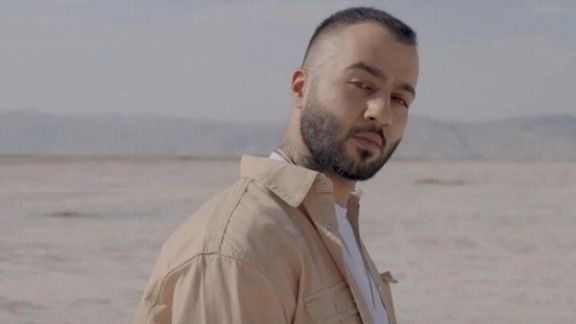
The re-arrest and violent detention of Iranian rapper Toomaj Salehi have ignited widespread condemnation and concern.
Social media users described his arrest earlier this week as a "kidnapping" and a manifestation of the regime's fear of Salehi's outspokenness as a protesting rapper.
Salehi, 33, was detained by plainclothes on a street in Babol, located in the north of Iran, on Thursday. He was subsequently transferred to an undisclosed location. Salehi's X page reported that the arrest took place without any judicial order and involved "severe physical abuse," with officers allegedly beating him using the butts of their AK-47 rifles and pistols.
The incident comes after Salehi spent over a year in prison, with 252 days in solitary confinement. He had been released on bail on November 18th. In response to his re-arrest, social media users initiated a trending campaign on Friday, with more than 75,000 mentions of Toomaj Salehi on the X social network. Many posts questioned his whereabouts.
Ye-One Rhie, a representative in the German parliament and Salehi's political sponsor, urgently called for his release in a video message. Rhie emphasized the importance of shedding light on the actions of the Iranian regime, stating, "Everyone needs to know what the Iranian regime is doing, that it is not abiding by its own constitution and kidnapping people for no reason."
Salehi gained prominence as an artist known for his protest songs addressing social issues and government injustices in Iran. The 33-year-old rapper was initially arrested on October 30th 2022, as part of a broader crackdown on regime's political opponents.